In this fourth session of my free non-fiction writing course we will be looking at how you can mine your own experiences for publishable material. It’s not all about ‘I was born at an early age and died before I was ready’, so if the cradle-to-grave expose’ doesn’t attract you, there are more ways to use autobiographical material in your writing. We will look at autobiographical ‘lens’ books and articles, life-story autobiography, family history and ‘true life’ articles.
Autobiographical Lenses
A lens is something you look through to bring something else into focus. In the case of autobiography, you are using your own life experiences to draw your reader’s attention to something else. For example I was commissioned to write an article on copyright for a writing magazine. I could have just written a factual piece giving the reader an understanding of what copyright is and how it applies to them, but instead I chose to use an illustration from my own life to show how a copyright issue might apply in real life. Note that my life itself is not of interest to anyone unless there is something in it that intersects with their own – in this case, the application of copyright law.
I did a similar thing with Common Ground, an article I wrote on Christian / Muslim relations. In it I used quite a dramatic episode in my own life as a springboard into a discussion on religious tolerance on a broader scale. Again, it was not my life that was of interest, but how one episode in it illustrated a dilemma that many people face in their own lives.
Lens Books
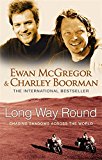 Ordinary people can write books about extraordinary events or situations. The recently published Eight Lives Down by Chris Hunter is an account of his time as a bomb disposal officer in Iraq. Frankly, readers don’t give a toss about Chris Whatsisname, but they do about the unique insight he has into a dangerous job in a controversial war. The same cannot be said of Ewan McGregor, who many readers do give a toss about (some more than others). He has capitalised on his celebrity to market his co-written books with fellow actor and biker Charley Boorman. Long Way Round and Long Way Down are not the cradle to grave stories of these two men, but a travelogue of their adventures on two unusual journeys (more on travel writing in a later session). Many ‘lens’ books are ghostwritten or co-written such as The Choice which I co-wrote with Elizabeth Robertson Campbell. The lens of this book focused on a series of events surrounding a woman’s attempt to convert to Judaism. Since publication though, Elizabeth has become quite a celebrity in South Africa and the USA as her story has touched so many people.
Ordinary people can write books about extraordinary events or situations. The recently published Eight Lives Down by Chris Hunter is an account of his time as a bomb disposal officer in Iraq. Frankly, readers don’t give a toss about Chris Whatsisname, but they do about the unique insight he has into a dangerous job in a controversial war. The same cannot be said of Ewan McGregor, who many readers do give a toss about (some more than others). He has capitalised on his celebrity to market his co-written books with fellow actor and biker Charley Boorman. Long Way Round and Long Way Down are not the cradle to grave stories of these two men, but a travelogue of their adventures on two unusual journeys (more on travel writing in a later session). Many ‘lens’ books are ghostwritten or co-written such as The Choice which I co-wrote with Elizabeth Robertson Campbell. The lens of this book focused on a series of events surrounding a woman’s attempt to convert to Judaism. Since publication though, Elizabeth has become quite a celebrity in South Africa and the USA as her story has touched so many people.
Some lens books are expose’s of public figures or institutions written by insiders. If you would like to write something like this, make sure you take legal advice as to what you can and can’t include (more of legal matters in a later session). Examples of this sort of book are The Cancer Industry by pharmaceutical whistle-blower Ralph Moss and The Third Man, a juicy insider’s view of the New Labour government under Tony Blair and Gordon Brown, by Peter Mandelson.
Exercise 10
Have you had any unusual experiences that might interest readers? Jot these down and say why you think they might be of interest. Alternatively, do you have any ‘insider’ knowledge of institutions or notorious events that might intrigue readers?
Life Story Autobiographies
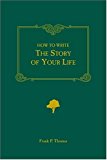 As a ghostwriter, I’m approached by people who want me to write their life story. These are frequently people who have just retired and have finally found the time to reflect on their rich and varied lives. The usual reason they decide to put pen to paper is that friends and family, who have listened to their colourful tales, invariably say: ‘you should write a book’! The first question I ask them (as nicely as possible) is: ‘why should anyone be interested in your life?’ They then answer: ‘because I’ve done so many interesting things’. That may be well and good, but what sets their life apart from anyone elses? I would usually advise these people to consider doing a lens book rather than a life story autobiography. On the other hand, some people just want to write their own story for friends and family. That’s a legitimate and noble reason, but please, don’t try to flog it on the open market. Life story autobiographies work best for already recognisable celebrities. For some bizarre reason we are interested in how long it took to potty train Paul McCartney or when Elizabeth Taylor first wore mascara. A good guide to help you get started in writing your life story is How to write the story of your Life by Frank P. Thomas.
As a ghostwriter, I’m approached by people who want me to write their life story. These are frequently people who have just retired and have finally found the time to reflect on their rich and varied lives. The usual reason they decide to put pen to paper is that friends and family, who have listened to their colourful tales, invariably say: ‘you should write a book’! The first question I ask them (as nicely as possible) is: ‘why should anyone be interested in your life?’ They then answer: ‘because I’ve done so many interesting things’. That may be well and good, but what sets their life apart from anyone elses? I would usually advise these people to consider doing a lens book rather than a life story autobiography. On the other hand, some people just want to write their own story for friends and family. That’s a legitimate and noble reason, but please, don’t try to flog it on the open market. Life story autobiographies work best for already recognisable celebrities. For some bizarre reason we are interested in how long it took to potty train Paul McCartney or when Elizabeth Taylor first wore mascara. A good guide to help you get started in writing your life story is How to write the story of your Life by Frank P. Thomas.
Exercise 12
Would you like to write a cradle to grave autobiography? If so, why? Now, unless you only want to do it for family and friends – and family and friends actually want you to do it for them – talk yourself out of it. There. Don’t you feel better now?
Family Histories
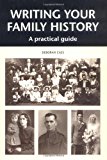 The same principles can be applied to family histories. Many of us have colourful ancestors, but unless something in their lives can be a lens on a significant event, institution or person, their life-stories are not marketable. Of course, if you want to write your history to give your family a sense of place and belonging, by all means do so, but don’t expect the general public to buy it. If you come from an already famous family, that’s different. The husband of a colleague of mine has recently found some old ancestral diaries from World War I. He has just signed a deal with a leading literary agent to sell the diaries to a top publisher. But again, that is a lens on a significant period of social history. An example of a successful family history book is My Traitor’s Heart by Riaan Malan. This tells the story of Malan’s slave-owning ancestors in South Africa and follows the family up to present day. However, Malan’s ‘lens’ is the shame of a liberal white man coming to terms with the racism of his ancestors.
The same principles can be applied to family histories. Many of us have colourful ancestors, but unless something in their lives can be a lens on a significant event, institution or person, their life-stories are not marketable. Of course, if you want to write your history to give your family a sense of place and belonging, by all means do so, but don’t expect the general public to buy it. If you come from an already famous family, that’s different. The husband of a colleague of mine has recently found some old ancestral diaries from World War I. He has just signed a deal with a leading literary agent to sell the diaries to a top publisher. But again, that is a lens on a significant period of social history. An example of a successful family history book is My Traitor’s Heart by Riaan Malan. This tells the story of Malan’s slave-owning ancestors in South Africa and follows the family up to present day. However, Malan’s ‘lens’ is the shame of a liberal white man coming to terms with the racism of his ancestors.
Writing your Family History by Deborah Cass is a good place to start. If you would like tips on tracing your history, then Track down your Ancestors by Estelle Catlett will be a help. Seeing we’re in the digital age, an invaluable guidebook for any amateur genealogist is The Genealogist’s Internet by Peter Christian.
Exercise 13
Do you have any interesting ancestors who lived during interesting times? If so, what ‘lens’ could you use to write about them?
‘True-Life’ Articles
Most of the commercial women’s magazines and tabloid press offer good money for sensational ‘true-life’ articles. There are even agencies that specialise in placing your story such as Front Page Agency. If you are a writer though, you might be disappointed if the editors won’t allow you to write it yourself. They will allocate your story to a staff member familiar with ‘house style’ who will act like a ghostwriter. Not all true-life articles are tabloidesque, so if you have an inspirational tale to tell or something that others can learn from, check out these market opportunities.
Exercise 14
Have you ever overcome a serious illness or lived through a traumatic event and come out a better person? If so, jot down some thoughts and see which magazine you would feel comfortable approaching. Have you discovered creative solutions to common problems (good fodder for short magazine ‘fillers’ or tip pages)? Again, consider which magazines might pay you for this information. If you have a lot of material on one subject you might consider putting together a proposal for a ‘how to’ book eg ‘How To Raise a Special Needs Child – a mother’s guide.’
Top Tips for Writing an Autobiography
- Even though this form of writing is technically non-fiction (that is based in fact), the most successful autobiographies, family histories and true-life stories are written using fiction techniques. View your material as research for a novel and consider plot development, characterisation and creative writing style. If you feel a little out of your depth, check out my free creative writing course for some ideas.
- If you’re wondering whether you’ve really got something worth putting into print, write it as a short story and ask someone who is good at writing to critique it. Don’t tell that person it’s really about you (obviously change names and don’t approach someone who knows you very well). If it’s successful it should be able to ‘pose’ as fiction.
- Make sure your friends and family approve of what you are doing. Many a family rift has occurred because one member saw events differently from another. You need to ensure you don’t compromise someone else’s confidentiality while hanging out your own dirty laundry or you may be open to a libel suit.
- If you’re struggling to remember past events clearly, spend a day paging through old photo albums, with, if possible, a couple of relatives who can fill in your memory gaps.
Exercise 15
Take a single memorable event from your past and tell the story in first person. Then rewrite the piece in third person and consider whether the event looks different to you now. (See writing from a point of view. This will encourage you to try to see yourself as a character in a story and allow you some objective writing distance. Now, if possible, ask another family member or friend to write their version of the event and see how it differs.
As already mentioned, there are lots of opportunities to publish articles based on yours or your family’s life stories – assuming they’re well-written, of course. The session later in this course on contacting editors will help you in your approach. However, you may consider going it alone and self-publishing. If you do go down this route, please be aware of the differences between this and mainstream publishing – this article on the Crafty Writer blog will help you with this.
In the next session we look at freelance travel writing.
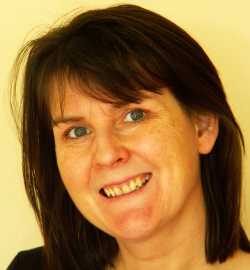 Welcome to The Crafty Writer's free online non-fiction writing course, presented by Fiona Veitch Smith, a freelance journalist, editor, author, playwright, screenwriter and writing teacher. I hope that you'll see a dramatic improvement in the quality of your writing as you work through this course.
Welcome to The Crafty Writer's free online non-fiction writing course, presented by Fiona Veitch Smith, a freelance journalist, editor, author, playwright, screenwriter and writing teacher. I hope that you'll see a dramatic improvement in the quality of your writing as you work through this course. 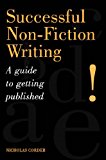
the horrific avents that took place in my life, suffered toture n abususefrm a family that was very powerfull.
I was tricked by a wife ov a husband that i was set up with, as i was alone no family i cryed 4 help but they wer two powerfull but today i feel free to speak the truth because the man that abused me is in prison
Oh, I believe I have a story to tell, that will sell, that will help women that have been abused by their fathers. My story involves, how siblings hate her even as an adult, the men that have abused her the older she got, people, so called friends that took advantage of her kindness, seeking for love in so many men on her back. Being abused in her marriage, the miscarriage of several unborn babies, not having a relationship with her mother on a mother daughter basis to this very day. How her father and every man in her family were all in prison, a curse that seemed would never be broken, a child not knowing happiness not one day in her life and even as an adult. The child grows up but is still a prisoner in her own mind, divorced & raising 2. Afraid because as a child she was locked up in the hot projects of WD. She was in a world and time that she would have to learn on her own. That is until she had an encounter with God.
Good luck to you in writing the book. It sounds like a traumatic story. Just make sure it is well-written too and you might get it published. A good story on its own is not what makes a publishable book.
Pingback: Non-fiction writing for the internet at The Crafty Writer
Pingback: True Life Stories - market opportunity at The Crafty Writer
thanxxxxxx!!!!!
i really need it.
ok so i wanted to know if i would a selling book about when i was 14 my mother was diagnosed with cancer and my depression, and how my mother was doing great and my father was diagnosed with lung, liver and bone cancer and my depression n how i handled that… also my tramatic car accident i needed spine surgery.. so if anyone has any ideas if i should even attempt to write about this please let me know.
Tragedy to triumph stories are very popular but make sure there is a triumph bit or it will just be too depressing. It should also go without saying that publishers want well-written books so if you’re serious about this do a few courses to help develop your writing skills. Good luck!
hi i am very interested in writing a book based on my life it has been said to me by many people to so, this however taking the first step is very daunting and as i am cautious would like to know how i can do this without any conflict with any of my family, in particular one or two of my sisters. can i do this in a way that i can express my intimate details of my life as i perceive it without using their correct names? i do not need any further problems as the life that i am writing about has been extremely upsetting and physiologically and spiritually challenging to say the least.it would contain some content along the following lines (loss first and foremost my loving wife at a very young age of cancer at just 45) ( my mother when i was only 21) sexual abuse physical emotional and psychological.
animals some disturbing incidents but some positive things too mainly a tribute to my late wife whom i would not be as i am today if it was not for her.
Hello Mike, yes you can change names, but surely your family will recognise themselves anyway? They have shared your life and will know what and who you are referring to. So unless you are prepared for that I don’t think you are ready to have a book like that published. You could change your name but then you would have to keep it quiet that you had written the book. But even then, if a family member or friend read it they would suspect it was you.
I wish you well in making your decsion,
Fiona
I am intrested in writing a book about my life. I am only 19 years old, but I feel like I have alot to say. Anyone know of a good way I can start?
Age is not a barrier in writing your life story,as in fact life stories could be in parts.you can start with some great experiences you’ve had the narrow it down to your age.You would surprised at the number of adult that would be moved by your life story.
Hi, I would love to do this course. Is tis a free course? How do I apply?
Regards
Sally
Hello Sally. You don’t have to apply. The course is already up on the website you simply work through it in your own time. Please read the information on the home page and that will tell you all you need to know to get started.